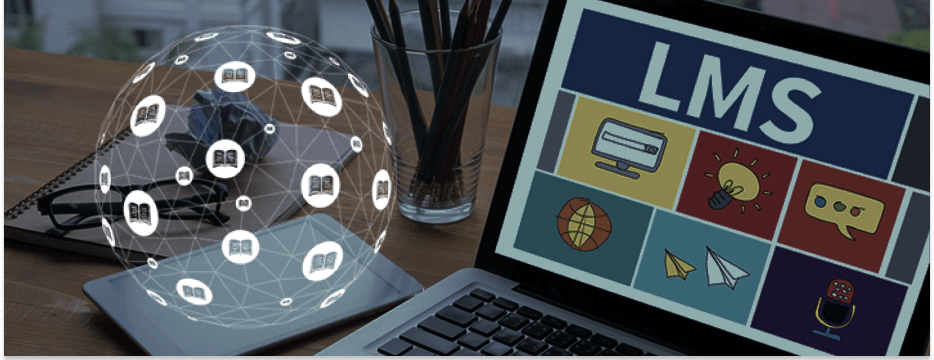|
Getting your Trinity Audio player ready...
|
AI in LMS (Learner Management System) powers smart infrastructure to enhance the significance of eLearning in corporate and academic setups. The vital practice of AI is empowering not only user experience but also improvising the LMS deployment by maximizing implementation, support, and consulting service outcomes.
The LMS market projections are escalating with practicing COVID-19 safety measures, as corporates, the public, and governments are leveraging LMS platforms as a crucial tool. According to the marketsandmarkets report, the LMS (learning management system) market will reach USD 22.4 billion by 2023.
Enhanced user experience and exceptional customer service are the challenges influencing the growth of the LMS market. And here is how AI applications can revitalize the LMS traditional architecture and improvise deployment and delivery modes; to tackle the COVID-19 pandemic and maximize the current market opportunities.
The Applications of Artificial Intelligence for LMS?
Applying AI is widely practiced in various industries to enhance their operations, and the same is applied to LMS tools. The applications AI transforming the LMS market by optimizing its performance by enhancing LMSs components, deployment, and delivery model. Components like LMS solution & LMS service, LMS deployment, and LMS delivery mode are core pillars in the LMS market. Discover below how AI and data science technologies rephrasing these core pillars to armor the LMS market during COVID-19.
AI-powered LMS components.
There are two types of components in the LMS market segment. 1. LMS solution and 2. LMS services.
- 1. LMS solution:
The purpose of buying an LMS-based solution is to ultimately train end-users. It could be corporate employees, users, user groups, students, etc. Learning-centric application with an advanced support tool is a targeted LMS solution. LMS tools powered with AI and machine learning algorithms can add advantages to the traditional LMS model by creating a user-centric learning experience, intuitive user experience, built-in reporting, native integrations, distinct learning capability, and regular update-based solutions.
- 2. LMS service:
LMS service is a cornerstone for any digitally developing LMS platform. There are distinct LMS-based services like supporting services, implementation services, and consultation services. Integrating AI and leveraging Machine learning algorithms to create a user-customized LMS model. The technology-integrated LMS model tracks user experience in real-time and then centralize and automates administration services. Content curation and training initiates are prominent AI-driven LMS based on consultation services. A scalable web-based platform, support portability, and standards are widely practiced implementation services.
-
Algorithms to tailor LMS deployment mode
The LMS market based on the deployment model can be differentiated as cloud and on-premises-based models. The increasing usage of digital learning platforms during the COVID-19 pandemic period creates implementation challenges in LMS deployment.
The prominent challenges among them are content integration, system customization, ongoing administration, IT issues, and system performance. AI and machine learning algorithms are making their prominence in building a compliance LMS model to meet individual needs quickly. It supports single or multiple web servers, redundancy, network path identification, separate content servers, and other cloud-based strategies to provide unparalleled system performance even when a user’s needs increase or change with time.
-
AI-powered LMS delivery
Integrating AI is at the core of an AI-powered LMS model. Each LMS Model has its components and unique features. Today LMSs are leveraged by both academics and corporates. Based on the user type, the LMS delivery mode is differentiated, and there are three types of LMS delivery modes; Distance learning, Instructor-led training, and Blended learning. The commonly shared features among these three learning models are automatic enrollment, reminders for mandatory courses, approval materials, and participation.
The AI-powered LMS delivery model integrates tracking analytics to trace user eligibility, performance goals, user objectives, class groupings, levels of security clearance, etc. for corporates the AI and machine learning tools can help in integrating human resources systems for better tracking of the employee learning path. The model identifies Employee ID to generate a report about employee skill sets, learning goals, top priorities, involvement in a particular project, etc.
The LMS continues to strengthen with all new applications and advancements in technology. Integrating AI and machine learning are enhancing the quality of LMS. The dynamic step of integrating technology is becoming the only choice for LMS providers who focus on learner-oriented, without ignoring quality. The changing dynamics in today’s education system have also been a core reason to integrate technology to make learning more engaging and progressive.
Is your LMS platform able to generate customizable, empathetic, intelligent, intellectually rich resource materials, and is future-ready?
If you need any help with idea validation, proof-of-concept, Data Science consulting, large-scale AI implementation, Big Data Engineering, or a creative solution for your LMS data or building a smart LMS platform. You are at the right place.
Talk to our experts

